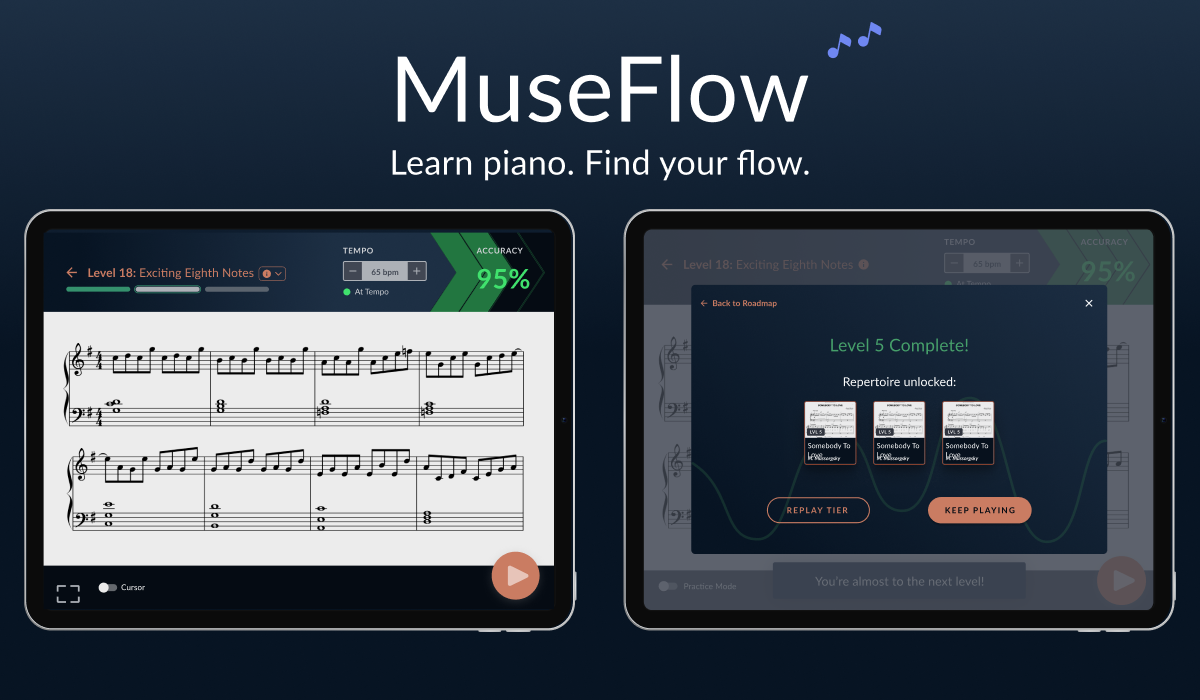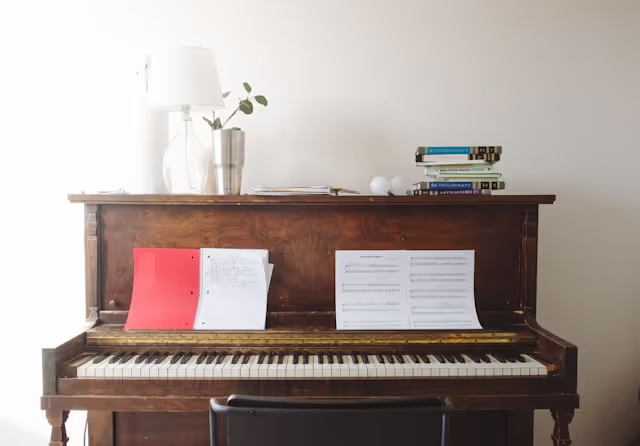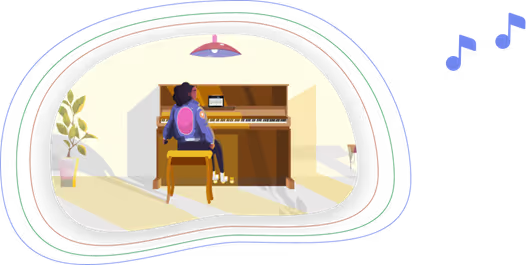How to Stay Motivated While Learning Piano- Tips from MuseFlow Experts
Learning to play the piano can be incredibly rewarding, but it also comes with a fair share of challenges. When learning any instrument it’s not always easy to stay motivated, especially when progress seems slow or when life gets busy... thankfully, MuseFlow is here to help you stay motivated while learning piano and make learning a lot more enjoyable. Read below to see how to stay engaged, have fun, and stay highly motivated.
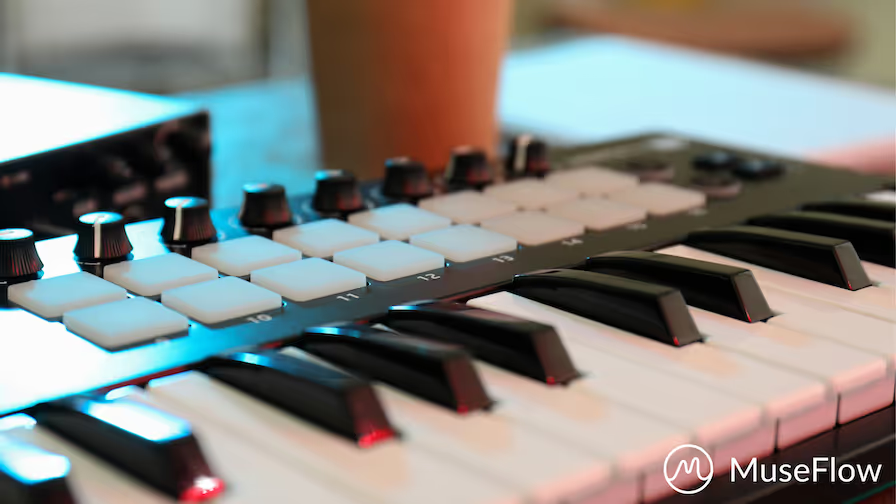
MuseFlow: Your Personal Motivation Partner
MuseFlow is more than just a piano learning app – it’s your personal partner in staying highly-motivated and achieving your musical goals. Here are a few ways the AI piano teacher excels in keeping learners engaged in the most fun way possible:
1. Personalized Learning Paths
The software uses advanced AI technology. It tailors your learning experience to your unique needs & progress. The app adapts to your skill level and learning pace, making sure that you are always working on material that is both challenging yet achievable... This personalized approach helps prevent frustration and boredom, two motivation killers. You will stay inspired to continue practicing.

2. Real-Time Feedback & Progress Tracking
Fast feedback is crucial for motivation. MuseFlow provides real-time feedback on your playing, allowing you to correct mistakes instantly! This is the best way to see fast progress. The app also strategically tracks your performance over time. This gives you detailed personal insights into your improvements. All users say they prefer this over a real person teaching them. Seeing tangible progress can be incredibly motivating!
3. Gamified Learning Experience to Stay Motivated to Play the Piano
The piano teaching app turns learning into a game. This means you will see glowing progress bars, level complete screens, and fun interactive tutorials. This gamification makes practicing so much more fun than before, and it also helps you stay committed to your learning routine! The great sense of accomplishment from seeing that level complete screen after beating each level boosts your confidence and will encourage you to keep going...

4. Entering the Flow State - You’ll Love This!
One of the technologies most LOVED features is its incredible ability to help you enter a state of “flow.” This state is the best state to learn. This is a mental state where you are fully immersed and focused on your practice. The experience becomes more enjoyable and productive. If you think back on your best learning experiences, they were very likely in a flow state. MuseFlow (the name already says it) is adaptive, and has a guided learning paths and real-time feedback that keeps your brain engaged, facilitating a state of flow, which helps you retain new information and develop skills a lot quicker.

Additional Tips to Stay Motivated While Learning Piano
1. Set Clear & Achievable Goals
It’s obvious but important. Setting clear, achievable goals is essential for staying motivated. Break down your larger goals into smaller and also manageable tasks. For example, aim to learn a specific song within a month, or master a particular technique over a couple of weeks. When achieving these smaller goals you get a better sense of accomplishment – this keeps you motivated to tackle bigger challenges. It will be easier to feel the progress you’re making!.
2. Create a Consistent Practice Schedule
You've heard it many times “consistency is key” especially when learning an instrument.. Get into a regular practice schedule that fits into your daily routine. Really even 15-30 minutes of focused practice each day will lead to very strong improvements over time. You can use free tools like Google Calendar to set reminders and block out dedicated practice time. If you miss a day, don’t be too hard on yourself. An amazing book to create habits is Atomic Habits: An Easy & Proven Way to Build Good Habits & Break Bad Ones by James Clear.
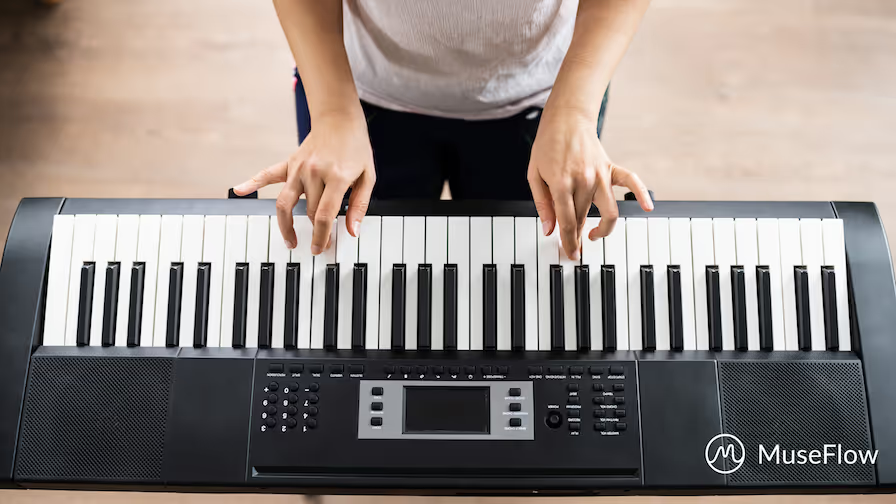
3. Find Inspiration in Music
Listening to a wide variety of different music can inspire & motivate you to practice. Check out new genres, artists, and pieces that excite you. Those will make you eager to play. Also make sure to attend live performances or watch videos of talented pianists to see what’s possible with dedication and practice… for inspiration, also check out the list of must-watch piano performances from Classic FM.
4. Join a Community
Connecting with other piano learners can provide support and encouragement, and also motivation. You can join online forums, social media groups and accounts, or local music clubs to share your progress, ask for advice, and celebrate achievements together! Everyone loves a sense of community. It can be incredibly motivating and help you stay committed to your learning journey.
Reddit’s r/piano is a great community for connecting with fellow piano enthusiasts.
5. Reward Yourself
Rewarding yourself for reaching milestones can really really boost motivation. Treat yourself to something special when you achieve a goal, whether it’s a new sheet music book, a relaxing break, or a favorite snack (or whatever motivates you). Continuous positive reinforcement can make the learning process more enjoyable, and encourage you to keep progressing. This is much better than always punishing yourself, thus, associating a bad feeling to learning to play piano.

Conclusion on How to Stay Motivated to Play the Piano
Staying motivated while learning piano is challenging for most. As mentioned above, with the right tools and strategies, it’s entirely possible. MuseFlow provides an amazing solution with its personalized learning paths, real-time feedback, gamified experience, and ability to facilitate flow state. These features make learning piano enjoyable and engaging, helping you stay committed to your musical journey. It’s the best music education technology out there in 2024.
In addition to using MuseFlow, remembering to set clear goals, maintaining a consistent practice schedule, finding inspiration in music, joining a community, rewarding yourself, and embracing challenges can all contribute to sustained motivation. We hope this helps you stay motivated and happy!
Start your musical journey with MuseFlow today and discover the joy of learning piano with an amazing and friendly partner that keeps you motivated every step of the way.


.svg)

.jpg)

